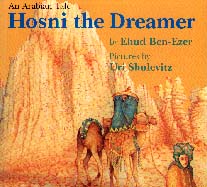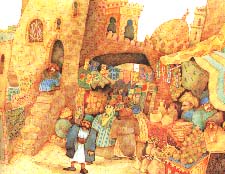

 |
Hosni the Dreamer: An Arabian Tale.
Ehud Ben-Ezer. Illustrated by Uri Shulevitz. Subject Headings:
Grades 1 - 4 / Ages 6 - 9.
**** /4
|

excerpt:
Hosni wandered through the city's streets, amid the noisy crowd. The more he walked, the more the city felt like his dream, and like the tribal elders' tales. Only now it was real, and even more exciting than he had imagined.He went to the city's market, passing by the shops and stands with their colorful cloth, embroidered robes, carpets, shiny pots and plates. The scent of pilaf, kebab, falafel, couscous, and sweet halvah filled the air. Hosni didn't buy anything. Then he noticed a sign on a small shop; "One verse for one gold dinar."
Hosni felt he must go in.
 Based on an old Arabian folktale, this enjoyable story features Hosni, a poor shepherd, who works for a sheikh. His evenings are spent listening to the tribal elders' tales of travel and adventure in faraway cities. Hosni dreams of seeing these cities some day and shares his dreams with his sheep, causing the other shepherds to tease him mercilessly. One day, the sheikh asks Hosni to accompany him and several of the shepherds on a journey to the city where he is going to sell his camels. Having made a quick sale, the sheikh gives each shepherd a gold dinar and the rest of the day off to enjoy the city. Hosni spends his dinar on a piece of wisdom given to him by an old man. "Don't cross the water until you know its depth." The shepherds tease Hosni again, this time for squandering his money. On the way home, the men notice, in the mountains, a violent downpour which is filling the wadi [dry river bed] that they wish to cross. Hosni, recalling the verse that he has just bought, warns the others not to cross the wadi, but they ignore him. A richly dressed stranger, leading a camel by a long rope, follows the men into the water. Suddenly, a powerful undercurrent sweeps the men away. From the canopy on the camel's back. Hosni hears a voice. It belongs to Zobeide, a young maiden, who is being sent, against her wishes, to a prince as a present. Hosni and Zobeide decide to travel together. In time, they grow to love each other and eventually marry. With the silver and gold that Zobeide's camel carried, they buy a large house and fields.
Based on an old Arabian folktale, this enjoyable story features Hosni, a poor shepherd, who works for a sheikh. His evenings are spent listening to the tribal elders' tales of travel and adventure in faraway cities. Hosni dreams of seeing these cities some day and shares his dreams with his sheep, causing the other shepherds to tease him mercilessly. One day, the sheikh asks Hosni to accompany him and several of the shepherds on a journey to the city where he is going to sell his camels. Having made a quick sale, the sheikh gives each shepherd a gold dinar and the rest of the day off to enjoy the city. Hosni spends his dinar on a piece of wisdom given to him by an old man. "Don't cross the water until you know its depth." The shepherds tease Hosni again, this time for squandering his money. On the way home, the men notice, in the mountains, a violent downpour which is filling the wadi [dry river bed] that they wish to cross. Hosni, recalling the verse that he has just bought, warns the others not to cross the wadi, but they ignore him. A richly dressed stranger, leading a camel by a long rope, follows the men into the water. Suddenly, a powerful undercurrent sweeps the men away. From the canopy on the camel's back. Hosni hears a voice. It belongs to Zobeide, a young maiden, who is being sent, against her wishes, to a prince as a present. Hosni and Zobeide decide to travel together. In time, they grow to love each other and eventually marry. With the silver and gold that Zobeide's camel carried, they buy a large house and fields.
Ben-Ezer tells Hosni's story with simplicity and empathy. He gives it a distinct Arabian flavour with his choice of vocabulary and his descriptions of the marketplace and the desert. Readers will find Hosni to be a likeable underdog.
Shulevitz's illustrations complement the text superbly. Rendered in mixed media in shades of rust, gold and teal, they echo the colours of the desert landscape. The richness and excitement of the marketplace are conveyed through the use of additional colour and details. Figures are deliberately drawn out of proportion, with short, rounded bodies clothed in voluminous robes, and large heads with interesting facial expressions.
A wonderful addition to any collection of multicultural folktales!
Highly recommended.
Gail Hamilton is a teacher-librarian at Bird's Hill School in East St. Paul, Manitoba.

To comment on this title or this review, send mail to cm@umanitoba.ca.
Copyright © 1998 the Manitoba Library Association.
Reproduction for personal use is permitted only if this copyright notice
is maintained. Any other reproduction is prohibited without
permission.
Published by
TABLE OF CONTENTS FOR THIS ISSUE - JUNE 5, 1998.
AUTHORS |
TITLES |
MEDIA REVIEWS |
BACK ISSUES |
SEARCH |
ORDER |
CMARCHIVE |
HOME
The Manitoba Library Association
ISSN 1201-9364